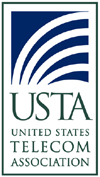 |
NEWS RELEASE 1401 H STREET NW SUITE 600 | WASHINGTON DC 20005-2164 | TEL 202.326.7360 | FAX 202.326.7339 |
FOR IMMEDIATE RELEASE
12:00 p.m.
November 18, 1999
CONTACT: David Bolger
(202) 326-7363
Line Sharing is Contrary to Intent of '96 Telecom Act
USTA Calls Line Sharing Government Mandated 'Market Manipulation'
FCC Continues to Pick Winners and Losers
Background: Today, the Federal Communications Commission staff adopted an order that would require incumbent local exchange carriers (ILEC) to share the broadband portion of the local exchange loop with Competitive Local Exchange Carriers (CLECs). This so-called 'line sharing,' requires separation of the analog or narrow band spectrum of the local loop from the digital or broadband spectrum for use by competitors. The Telecommunications Act of 1996 requires ILECs to lease the entire loop -- not portions thereof -- to competitors at a wholesale rate. The following statement may be attributed to Roy M. Neel, President and CEO of the United States Telecom Association.
WASHINGTON, DC -- "Today's order by the FCC to mandate line sharing is in direct conflict with Congress' intent when it created the Telecommunications Act of 1996, which sought to encourage facilities-based competition in the telecommunications market. Today's action by the FCC to mandate sharing portions of the local loop is clearly a giant step in the wrong direction."
"Not only will line sharing create a tremendous disincentive for investment by the local exchange carriers in the deployment of digital subscriber lines and other advanced services, but it will also disincent would-be facilities-based CLECs who believe in the benefits of broadband investment to serve consumers. Today's order is the ultimate form of market manipulation by the regulator to the advantage of some industry service providers, CLECs and cable companies, over another, ILECs. The FCC once again appears to be applying its public policy in a wholly inconsistent manner. Compare the passive approach the Commission takes toward the cable industry in its deployment of broadband services to the FCC's heavy-handed and invasive action by demanding the sharing of the local loop. By this decision the Commission draws close to the line of the nationalization of ILEC networks. The FCC should stop discriminating against incumbent local exchange carriers by regulating their deployment of DSL and other advanced services while supporting their unregulated competitors' ability to avoid investing in their own broadband networks or refusing to prohibit their discrimination among customers.
Despite the Commissions' acknowledging that CLECs are ahead of the ILECs in broadband deployment, the FCC once again deems itself 'referee' to choose winners and losers in the telecommunications marketplace. While the FCC claims to be pro-competition, today's order strikes a strong anti-competitive chord and is a direct assault on the UNE standard set forth in the Supreme Court's UNE decision last January.
For more than one hundred years, the USTA has been representing the interests of the small, mid-sized and large companies of the nation's local exchange carrier industry. The Association represents more than 1,200 companies worldwide that provide local exchange, long-distance, wireless, Internet and video services.
# # #